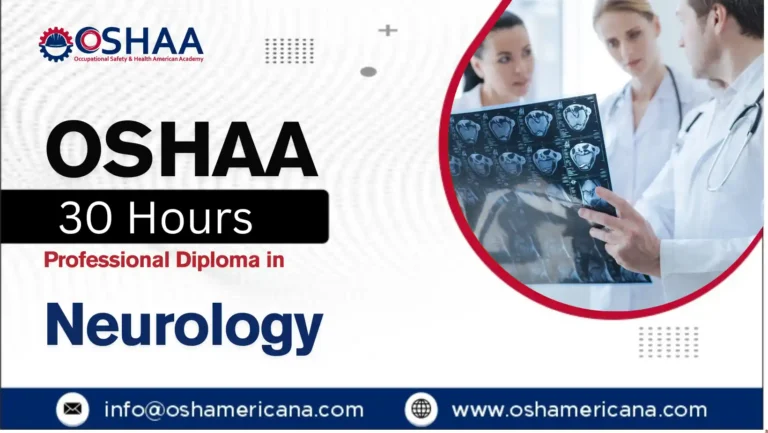Post-Traumatic Stress Disorder (PTSD) is a complex mental health condition that affects individuals who have experienced or witnessed traumatic events. Without proper intervention, PTSD can have a significant impact on an individual’s mental, emotional, and physical well-being. The OSHAA 30-Hour Diploma in PTSD: Treating Trauma and Managing Symptoms is designed to provide a comprehensive understanding of PTSD, its symptoms, and effective treatment strategies.
PTSD is a mental health disorder that can develop after exposure to a traumatic event such as war, natural disasters, abuse, accidents, or violent assaults. Individuals with PTSD may experience flashbacks, nightmares, severe anxiety, and emotional distress. If left untreated, PTSD can lead to long-term psychological difficulties, affecting relationships, work, and daily life.
The OSHAA 30-Hour Diploma in PTSD is an intensive training program designed for professionals and individuals who wish to develop expertise in trauma-informed care. The course covers the psychological, physiological, and social aspects of PTSD, along with evidence-based treatment approaches.
The OSHAA 30-Hour Diploma in PTSD is a vital qualification for anyone looking to enhance their knowledge and skills in trauma-informed care. By understanding PTSD and effective treatment strategies, professionals and caregivers can make a significant impact on the lives of those affected by trauma. This diploma provides the necessary tools to support recovery, improve mental health outcomes, and promote resilience in individuals experiencing PTSD.
OSHAA 30-Hours Diploma in PTSD: Treating Trauma and Managing Symptoms
Study Units
Learning Outcomes
Introduction to PTSD and Trauma (2 Hours)
- Define Post-Traumatic Stress Disorder (PTSD) and understand its core features.
- Explain the causes and risk factors associated with PTSD.
- Identify the prevalence of PTSD across different populations.
Recognising Symptoms and Diagnosis (3 Hours)
- Identify the key symptoms of PTSD as outlined in diagnostic criteria.
- Understand the process of diagnosing PTSD and the role of healthcare professionals.
- Recognise the different stages and severity levels of PTSD.
The Neuroscience of Trauma (3 Hours)
- Explain how trauma affects the brain and nervous system.
- Understand the physiological response to traumatic events and its long-term effects.
- Identify the brain regions involved in trauma processing and memory.
Psychological and Physiological Impact of PTSD (3 Hours)
- Examine the psychological effects of PTSD on an individual’s mental health.
- Understand the physiological impact, including stress responses and physical symptoms.
- Identify the connection between mental and physical health in PTSD sufferers.
Therapeutic Approaches and Treatment Strategies (5 Hours)
- Understand the range of therapeutic approaches used to treat PTSD.
- Evaluate the effectiveness of different treatment options for PTSD.
- Identify the importance of a trauma-informed approach in therapy.
Cognitive-Behavioural Therapy (CBT) and Exposure Therapy (5 Hours)
- Define Cognitive-Behavioural Therapy (CBT) and its application in treating PTSD.
- Understand the principles of Exposure Therapy and its role in reducing trauma-related symptoms.
- Develop skills in applying CBT and Exposure Therapy techniques in clinical settings.
Medication and PTSD Management (3 Hours)
- Understand the role of pharmacological treatments in managing PTSD.
- Identify common medications used in PTSD treatment and their potential side effects.
- Recognise when medication may be appropriate in the overall treatment plan for PTSD.
Coping Mechanisms and Self-Help Strategies (3 Hours)
- Identify effective coping strategies for individuals with PTSD.
- Develop skills in guiding individuals to use self-help techniques for managing symptoms.
- Understand the importance of emotional regulation and self-care in PTSD recovery.
Support Systems and Trauma-Informed Care (3 Hours)
- Recognise the role of family, friends, and community support in recovery from PTSD.
- Understand the principles of trauma-informed care and its application in different settings.
- Identify how to create a supportive and safe environment for individuals with PTSD.
- Comprehensive Understanding of PTSD – Gain a deep understanding of Post-Traumatic Stress Disorder, its causes, symptoms, and the profound impact it has on individuals’ mental and physical well-being.
- Evidence-Based Treatment Approaches – Learn practical, research-backed therapeutic methods including Cognitive-Behavioural Therapy (CBT), Exposure Therapy, and other trauma-focused interventions to effectively treat PTSD.
- Specialised Knowledge for Mental Health Professionals – Equip yourself with the skills and expertise needed to provide effective support and treatment for individuals experiencing PTSD, enhancing your professional credibility.
- Practical Application in Clinical Settings – Develop hands-on skills in managing and treating PTSD symptoms through practical techniques that can be immediately applied in therapeutic, healthcare, and community settings.
- Career Advancement Opportunities – Enhance career prospects within mental health, healthcare, social work, and crisis intervention sectors by adding a specialised qualification in trauma and PTSD management to your portfolio.
- Improved Client and Patient Outcomes – Learn how to identify PTSD symptoms early, provide effective intervention, and guide individuals towards recovery, ultimately improving their quality of life.
- Support for Individuals and Families – Understand how to provide comprehensive support not only for individuals with PTSD but also for their families, helping them navigate the challenges associated with trauma.
- Ethical and Trauma-Informed Care Practices – Learn to deliver compassionate, ethical care while understanding the importance of cultural sensitivity, trauma-informed practices, and safeguarding principles.
- Holistic Understanding of Trauma’s Impact – Explore the psychological and physiological effects of trauma, enabling you to address both mental and physical symptoms when providing treatment for PTSD.
- Flexibility in Learning – Benefit from a flexible learning format that caters to different professional backgrounds, allowing you to study at your own pace and apply the knowledge in real-world scenarios.
The OSHAA 30-Hour Diploma in PTSD: Treating Trauma and Managing Symptoms is designed for a wide range of professionals who work with individuals affected by trauma and PTSD. This course is ideal for:
- Mental Health Professionals – Psychologists, psychiatrists, counsellors, and therapists seeking to specialise in PTSD treatment and trauma recovery.
- Healthcare Providers – Nurses, doctors, social workers, and occupational therapists who want to enhance their ability to recognise and manage PTSD in their patients.
- Crisis Intervention and Support Workers – Professionals working in emergency services, crisis centres, or humanitarian aid, who need to understand trauma and its effects on individuals.
- Social Workers and Case Managers – Those working with vulnerable populations and individuals in crisis who need to implement effective trauma-informed care strategies.
- Educators and School Counsellors – Teachers and school staff supporting students who may have experienced traumatic events or who are dealing with PTSD.
- First Responders – Police officers, paramedics, and fire fighters who may encounter trauma victims and need to be equipped with the knowledge to offer immediate support.
- Veterans and Military Support Staff – Individuals working with military personnel or veterans who have been affected by trauma and are seeking to provide targeted care.
- Caregivers and Family Members – Family members or caregivers of individuals with PTSD, who want to understand the condition better and learn how to provide effective support.
- Anyone Interested in PTSD and Trauma Recovery – Individuals looking to broaden their understanding of PTSD, its symptoms, and effective treatment strategies, whether for personal or professional development.







